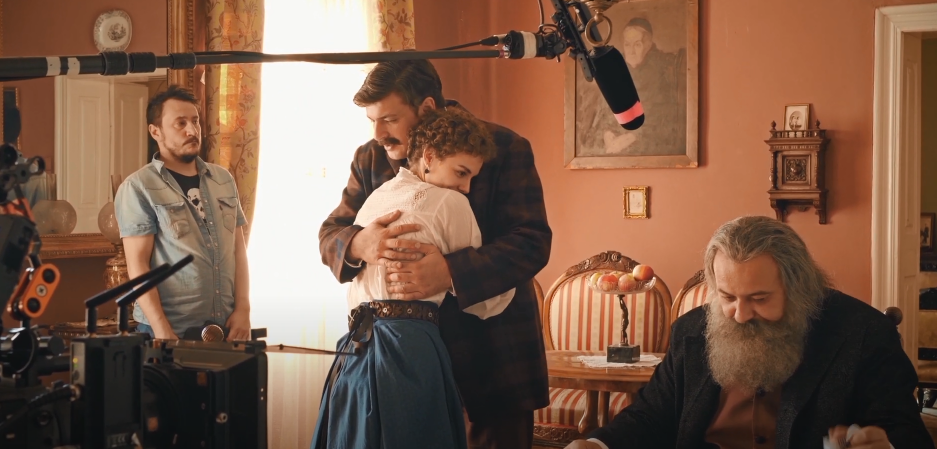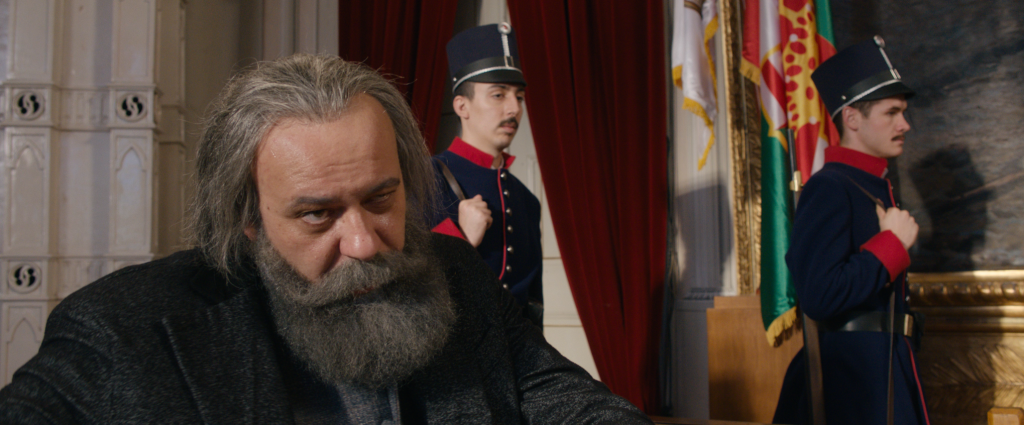“Let the state subsidize advertising of films in the media and put theatres, exhibitions, and concerts on the front pages of newspapers instead of participants in monstrous reality shows – maybe this is an opportunity to beat the reality show virus once and for all.”

The television series „The Name of the People“ („Ime Naroda“), directed by Darko Bajić and written by Milovan Vitezović, was recently aired while the eponymous film had its premiere in cinemas late last year. „The Name of the People“ is a biographical/historical drama about Svetozar Miletić, a respected lawyer and lifelong fighter for the rights and independence of Serbs in Austro-Hungarian Vojvodina, as well as one of the key figures in Novi Sad and 19th-century Serbian history. Also, this is the story about his daughter, Milica Tomić, the first journalist in Serbia, and her husband Jaša Tomić, who was Miletić’s successor in the Serbian People’s Liberal Party, and who declared the annexation of Vojvodina to the Kingdom of Serbia in 1918.
Darko Bajić is a film and theatre director, who directed a long list of iconic films including Direktan Prenos, Crni Bombarder, Balkanska Pravila, Rat Uživo, Na Lepom Plavom Dunavu, O Gringo, Bićemo Prvaci Sveta, Linija Života and last but not least, Sivi Dom, a television series that made him famous. As far as his theatrical accomplishments go, he directed the play Klaustrofobična Komedija. Darko Bajić has been a professor of film directing at the Faculty of Dramatic Arts in Belgrade for almost four decades.

Ime Naroda is one of the several Serbian historical films that were screened this year. The impression is that the state wants to present itself and its history to the world through a film. Do you agree?
On the eve of the TV premiere, I said that I would be extremely glad that, once the audience finished watching the film, they would contemplate whether they had stopped believing in ideals. We live in a world of hatred, division, perverted values, fabricated lies produced by the media, social networks and public discourse at the global level. There is no vaccine for this kind of “pandemic”. The glorification of the values created by money and encouraging mediocrity and its media promotion have upheld a film hero of the new century – a man who has no hope for a better tomorrow, who is devoid of ideals, a loser. Thus a rebel in me made a decision – I will make films about people who believe in ideals.
This is how the documentary about the football star Dejan Petković Rambo was made, a Serb and the only European who became the best football player and icon in Brazil thanks to his strength and ideals. After that, I directed a feature film and TV series called Bićemo Prvaci about our basketball underdogs who managed to beat the American national basketball team and who made winning world championships and medals a matter of national pride to be followed by the future generations. The film Linija Života is about my brave father, the painter and university professor Miloš Bajić, who survived the monstrous crimes committed by the SS in the Mauthausen concentration camp in the Second World War. The film Ime Naroda about Svetozar Miletić is a continuation of my search for idealistic heroes.
Judging by the awards that the film won, including the Audience Award at the Palić Film Festival, do you think that people are still eager to uphold the aforementioned values?
Yes, that’s why I make movies for them about fighters and heroes that they can identify with. During the Serbian-Turkish war, Svetozar Miletić was convicted of high treason in a rigged political trial. It was extremely important that the most prominent political figure in the community of European states, the then Austria-Hungary, should be removed from the political scene, at the time of the first annexation of Bosnia and Herzegovina by the Berlin Congress in 1878, and after the withdrawal of the Turks from Bosnia. The Monarchy had been planning this for a long time and did not want a rebellion among Serbs, the majority of whom lived in Bosnia. That’s how it all started and has been going on for centuries.

Shooting a historical film implies at least two mandatory components – a present view of the past and a faithful presentation of the events that are the film’s theme. How did you reconcile these two extremes?
The author talks about his view of the world and thus becomes a witness to the time in which he lives. It is not easy for directors to deal with historical topics in the new age when appetites for various revisions of history have grown. On the one hand, there is the danger of nationalism, so for that not to occur it is recommended to look to the future and not the past. On the other hand, Europe will have to recognize that an important and indisputable part of its own historical heritage lies in Serbian history.
Each cut between the two frames is a new challenge for the viewer. The audience’s expectations disappear and start again with each new frame. This is why a film director is also a researcher since he is expected to discover hitherto inaccessible truths, but also oppose lies.
In the last century, while taking on the idea of Pan-Slavism, Illyrianism and Yugoslavism, Serbia lost its character and personal integrity somewhere along the way and we suddenly woke up and realized that instead of liberating our own and other peoples in the Balkans, after Yugoslavia fell apart, we became occupiers, aggressors, the only culprits and bad guys in the eyes of the world. This is why it suited Europe for the representatives of that nation to be seated in the back at the celebration of the centenary of the Great War in Paris, even though our ancestors, all 1,247,435 of them, a third of the then total population, did not live to see the end of the war in 1914. The Serbian army went to hell and back, fighting alongside the allies, as the only Balkan army. This is one of the important reasons why we need to make films about our history. With today’s popular revision of history, who knows in which row we will end up being seated at the next celebration.

When filming Ime Naroda, were you weighed down by the fact that many viewers will think of Svetozar Miletić and the time he lived in based on your film and not on historical lessons?
For the first time in the 21st century, thanks to film, humanity could see the realistic picture of the last century. The history that was written during communism in the Socialist Federal Republic of Yugoslavia (SFRY) largely neglected Serbian history, and perhaps that is why our films that frequently cover the life experiences of famous people and their significance for the history of Serbia have become more noticeable. It was a great adventure for me to let my imagination take me back to the 19th century.
The uniqueness of your film is that you shed light on Milica Tomić, a rather obscure figure in our history, even though she was one of the first advocates of gender equality in the 19th century.
Once I, so to speak, discovered Milica Tomić, the daughter of Svetozar Miletić, while preparing to shoot this very complex film, which begins in the mid-19th century and ends in the second decade of the 20th century, the film took the right direction. I found out that Milica was an exceptional heroine, important not only for Novi Sad but also Europe.
You are no stranger to research in your work. In that regard, I would like to single out the documentary Linija Života, as a special type of research, considering that the topic was the life of Miloš Bajić, our great artist and your father. What do you usually look for when researching?
Miloš said that “human creativity and the trace that leaves in time are the most valuable parts of human civilization.” The film showcases my relationship with Miloš, my father and the artist. Miloš Bajić, who was assigned camp number 106621, created his authentic signature in the Mauthausen concentration camp, for fear of being discovered and shot. He drew and hid drawings that thus became a testimony to crimes, but also a warning “that the youth should try to reach the most distant stars, but never go back to that time again.” It was there that his painting line was created, which later resulted in him making the first abstract paintings in socialist Yugoslavia and a kind of “a journey into the cosmos” in honour of magnificent life
The cinema premiere of Ime Naroda took place at the height of the coronavirus pandemic. And yet, if I’m not mistaken, the viewing figures were quite big.
This has been a difficult year for all of us, with several films still waiting for their premiere. I am confident that they will have excellent viewing figures too because they have been directed by fantastic directors. Since I was a professor to most of them, I can say with conviction that a good film season is ahead of us. With Ime Naroda, we have heroically defended cinema and now it is up to the state and media to provide a concrete stimulus and promote the cinematic life of the movies that come after Ime Naroda. Let the state subsidize advertising of films in the media and put theatres, exhibitions, and concerts on the front pages of newspapers instead of participants in monstrous reality shows – maybe this is an opportunity to beat the reality show virus once and for all. If there is one thing we have learned during quarantine, it is that the abundant film and cultural programmes on TV and online platforms helped us survive isolation and ward off depression.
Should I even ask you about your next project or is it implied that you will wait for more stable times?
I am making a new film based on the book by Vladimir Kecmanović called ‘Siberia’. Fighters never sleep.
By Sonja Ćirić